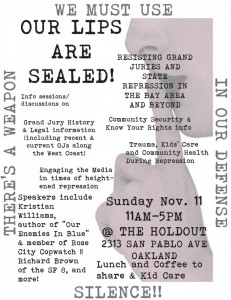When I was in Oakland a couple weeks ago, I gave a speech at a rally demanding justice of Alan Blueford, a young man shot and killed by the Oakland police.
The demonstration drew a crowd a few hundred strong. After hearing speeches from several people who had lost family to the cops, we marched to the police station, where I briefly spoke.
The text of my speech is below. To learn more about the Blueford case, and the organizing that has resulted, please visit: http://justice4alanblueford.org/
“Our demands should be an attack.”
We are here today, with grief and anger, because the police shot and killed Alan Blueford.
But not just Alan Blueford. We are here because the police killed Mack Woodfox, Jose Buenrostro-Gonzalez, Anita Gay, Oscar Grant — and so many others.
In a country where police kill, on average, 364 people per year — nearly one a day– and where 35% of these people are black, when the cops shoot a young black man it cannot be treated as an accident. It cannot be understood as a mistake. It is not even a crime in the ordinary sense.
When the cops kill people of color that is simply the normal operation of a racist institution in a grossly unequal society. That’s the job that the police are put there to do.
That role goes all the way back to the origin of the institution. The modern US police are the descendants of an older body called the slave patrols. Those patrols were militia organizations responsible for keeping slaves on the plantation and, more importantly, responding to or preventing slave revolts. As the country industrialized and urbanized, the slave patrols evolved and took on the characteristics of what we now recognize as a modern police force. And, tellingly, their mission expanded — not only the control of slaves, but free blacks and poor whites as well.
In the 200 years since, the form of inequality has changed — from slavery, to segregation, to legal equality masking social inequality — but the role of the police has remained remarkably constant. The police developed to control poor people and people of color, and they are still on that job today.
That suggests to me, very strongly, that the racism and violence of the police are not incidental, but are inherent features of the institution. And that means, among other things, that we cannot reform our way out of our police problem.
The twentieth century was the century of reform. We saw progressive campaigns against municipal corruption, mid-century efforts to professionalize the police force, then the introduction of military discipline, the emergence of community policing, diversity training, and the creation of advisory boards. And as a result, the police today are better paid, better trained, better organized, better armed than at any other point in history — and they continue to act as racist thugs. That core function of preserving inequality remains very much the same.
Our efforts, then, should not be directed toward fixing this institution — but toward destroying it. As we make our demands and plan our campaigns, this ultimate goal must always be kept in mind. We should pursue changes that de-legitimize, demoralize, discredit, and disempower the police and which, correspondingly, energize, embolden, and empower the community. When we demand justice, let us be clear that it is not the justice of the courts and the government, but the justice that abolishes courts and government that is required. Our very demands should be a form of attack.
